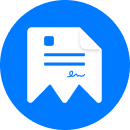Every business incurs costs, whether for internal operations or external activities. While businesses often cover these expenses directly, there are instances when employees pay upfront for necessary purchases.
That’s right, sometimes they spend their own money only to make sure the business keeps operating normally. The money spent on business activities is considered reimbursable expenses, which means employees can claim the reimbursement.
Since employees are spending their own money on business operations, it’s the employer’s duty to reimburse the costs on time. However, if you are not sure about what are reimbursable expenses and how to record reimbursed expenses, here we have a comprehensive guide on reimbursable expenses. Let’s get started.
What are Reimbursable Expenses?
Reimbursable expenses refer to the costs required to perform business operations and are incurred by the business on behalf of someone else. Generally, such costs are incurred when a company’s employees purchase goods or services with money straight out of their pocket.
Employees can later claim the money back as expense reimbursement. So, these reimbursable expenses are associated with business activities but were paid by the employee. That’s why they can’t be considered billable expenses, as the money wasn’t paid by the business initially.
Common Types of Reimbursable Expenses

Below are some of the most common reimbursable expense types that you should know when it comes to processing the reimbursement.
1. Travel expenses
Any costs associated with business trips like airfare for flights, train tickets, or bus fares to reach the destination, along with accommodations such as hotel stays fall under travel expenses. Car rentals, taxi services, tolls, and parking fees for personal vehicles used during work-related travel are considered reimbursable. Travel insurance or fees for acquiring travel visas may also be covered.
2. Dining costs
Meals and refreshments brought by employees while on a business trip will be reimbursable. Breakfast, lunch, dinner, or even coffee breaks during meetings with clients are reimbursable expenses. Many companies may have specific guidelines for dining costs to make reimbursement claims. If your dining costs comply with the given criteria, you may be required to submit the food bills and receipt to the concerned department.
3. Phone & internet charges
Your mobile phone and internet charges for work-related activities are part of reimbursable expenses. This is especially true for employees using their personal devices. Many companies agree to count mobile data charges for attending virtual meets or international calls as reimbursable expenses. So, they reimburse employees for a portion of phone or internet bills in case they were used for business work.
4. Marketing costs
Advertising activities or promotional events done by employees on behalf of their company can also be labeled as reimbursable costs. From purchasing branded merchandise to printing flyers, every marketing cost incurred can be claimed as reimbursable expenses. No matter how many employees are covering these costs with their own money, they can provide proof of payment and submit the reimbursement request.
5. Office supplies
Any office essentials purchased by employees to perform their duties refer to the reimbursable expenses. Pens, notebooks, printer cartridges, and USB drives are some common office materials usually purchased by employees, which can be later claimed as reimbursement costs. Employees will need valid documents and should justify the need for office materials in order to make successful claims.
Manage Reimbursable Expenses at Your Fingertips
Use Moon Invoice to manage reimbursable expenses with just a few clicks, instead of doing manual things.
How to Track Employee Expense Reimbursements
Tracking employee expense reimbursements is not easy as you need to record each expense and then generate a report. On the other hand, your employees should learn about the reimbursement policy and the types of documents they need to submit. Since it’s more time-consuming to handle things manually, let us understand how the right expense management software makes it easier for you.
Moon Invoice, an advanced expense tracking software, brings in a host of automation features to free you from manual checkups. You can add as many expense receipts in the software and create an accurate report in the blink of an eye.
With Moon Invoice, you don’t need to collect & scan receipts papers to validate the claim. You can review auto-generated reports on the go and process reimbursement, saving time and effort.
Here’s how to keep track of employee expense reimbursements with a breeze:
- Open the Moon Invoice app
- Go to ‘Expenses’ & create receipts digitally
- Later, generate the expense report from ‘Reports’
- View or download the report for detailed analysis
Alright, now let us look at reimbursable expenses examples.
Examples of Reimbursable Expenses
Let’s say you are working in a marketing & advertising company in the US. One day you were asked to travel to Philadelphia for a client meeting. Following the meeting, you also took the client for lunch by availing of local cab services. In this scenario, the cost incurred for your flight tickets, meals, and transportation will fall under reimbursable expenses.
This means you can claim reimbursement for money spent by you when you were hosting a client meeting on a company’s behalf. Since the costs are linked to business purposes, you can make a reimbursement claim with valid documents.
Know About Expense Analysis
What’s the Difference Between Reimbursable and Non-reimbursable Expenses?
Reimbursable expenses are tied to business operations and paid by employees. They can be claimed as employee expense reimbursement by submitting necessary documents. Whereas, non-reimbursable expenses are for personal use and have nothing to do with business operations. So, they can’t be claimed as reimbursement because funds aren’t used for business projects.
Let’s understand what are reimbursable and non-reimbursable expenses in detail.
Reimbursable Expenses
- Airfare or train tickets
- Accommodation charges
- Lunch or dinner costs
- Fuel charges for personal vehicle
- Office supplies
- Membership fees
- Internet or phone bills
Non-reimbursable Expenses
- Flight tickets for a vacation
- Snacks outside of work-related travel.
- Entertainment activities unrelated to business.
- Vehicle parking tickets
- Penalties
- Gifts
- Personal gadgets
- Gym membership
Are Reimbursements Taxable Income?
No, reimbursements are not considered taxable income if they align with the accountable plan. In simpler terms, if the cost incurred is tied to business-related expenses and supported by valid documentation, the reimbursement is not taxable. This allows employees to be compensated without any additional tax liabilities.
However, if the reimbursement does not meet the company’s policy, it might be considered taxable income. For example, expenses like house rent or lump-sum money that are not linked to business activities could be subject to taxation. Therefore, it is advisable to consult your accountant to understand your company’s policy before claiming a reimbursement.
Centralize Your Expense Receipts with Moon Invoice
Switch to Moon Invoice and store your important documents on the cloud platform for hassle-free expense management.
Conclusion
Reimbursable expenses are essential for every business and to ensure employees are not financially burdened. If employees have spent their own money, the employer must reimburse the cost, regardless of how big or small the amount is. However, if processing reimbursement is challenging for you, we recommend using Moon Invoice.
With Moon Invoice, you can not only save expense receipts digitally but also generate accurate reports within seconds. As a result, you don’t need to waste more time verifying the claim and delaying the approval. Start a 7-day free trial now.














